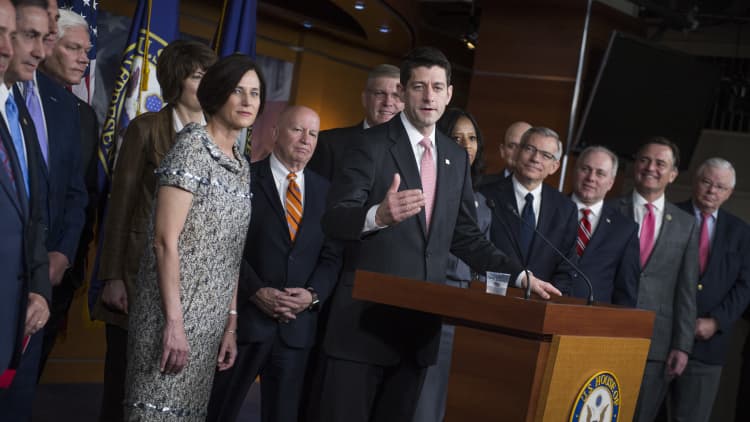
Let's see if this does the trick.
House Republican leaders, looking to jump-start their floundering effort to repeal and replace Obamacare, on Thursday said they were proposing creating a $15 billion federal high-risk pool that would provide insurance coverage to Americans with pre-existing and often serious health issues.
Speaker Paul Ryan said the provision would "lower premiums" for other, healthier people who buy individual health plans by shifting the risk of covering higher health-care users to the federal risk pool.
Ryan, R-Wis., also said it "gets us closer together, closer to that consensus" needed to pass the GOP replacement bill.
But, "I want to be clear: we still have more work to do," Ryan told reporters.
The federal pool, which would be funded with $15 billion, would be replaced by individual state-run high-risk pools in 2020.
It is far from clear whether the inclusion of the provision — which is based on the state of Maine's high-risk pool — in the American Health Care Act bill would do enough to garner the Republican votes needed to pass that legislation, and send it to the Senate for review.
Rep. Kevin Brady, the Texas Republican who is chairman of the Ways and Means Committee, said, "We're making a small but important step," with the provision. But he echoed Ryan in saying conversations are continuing within the GOP caucus on what can be done to achieve consensus on the bill.
State-run high-risk pools have been criticized by Obamacare advocates as having been ineffective at covering the health-care needs of many people who before the Affordable Care Act were unable to afford private insurance plans.
An article on the Health Affairs Blog in February, "States Be Warned: High-Risk Pools Offer Little Help At A High Cost," said that "high-risk pools' flaws may be
Larry Levitt, an Obamacare expert at the Kaiser Family Foundation, tweeted that the new provision is not likely to achieve the stated goals of lowering insurance premiums for individuals not covered by the pool.
The Republican bill has been stalled in the House for more than two weeks. On March 24, in an embarrassing setback for the GOP leadership and President Donald Trump, Ryan had to pull the bill from the floor of the House right before a scheduled vote because a group of between 20 and 40 Republicans were expected to vote against the plan.
Since then, leaders have been meeting with the conservative and moderate holdouts to discuss possible changes to the bill to win their votes.
An effort to get consensus on the bill so that it could be voted on before the House goes into recess for two weeks on Friday appears to have failed.
A number of Conservative Republicans have opposed the ACHA because they believe it does not go far enough toward repealing Obamacare. But some moderate GOP congressmen have opposed it because it would too drastically roll back gains in insurance coverage seen under Obamacare.
That schism, coupled with total opposition to the bill by the Democratic minority in the House, has put the GOP in the awkward position of being unable, for now, to achieve their long-desired goal of gutting the ACA, despite having majority control of Congress.
Leslie Dach, director of the Protect Our Care Campaign, an Obamacare advocacy group, said the the new provision would make an already bad health-care bill worse.
"Republicans refuse to stop trying to take away people's health care," Dach said.
"Despite 83 percent of people opposing their failed plans to repeal our care, Republican leadership is promising to bring their bill up for a vote that has already been rejected," he said. "Republicans seem to have learned nothing and are determined to raise health care costs and now are planning to gut protections for people with pre-existing conditions."
"As Republican members of Congress head home for recess, each of them will have to answer yes or no to whether they support a repeal plan that raises premiums by 20 percent, takes coverage away from 24 million people and ends protections for people with pre-existing conditions. Their constituents anger will only grow until they understand it's time for them to stop their rush to repeal our care."
But long-time health insurance executive Jeffrey Smedsrud said the Republican proposals is a "step forward that would have an almost immediate impact in bringing more insurers back into markets, and stabilizing premiums."
"There is nearly a one-to-one ratio in this type of financing being translated into premium reductions," said Smedsrud, co-founder of the insurance comparison site HealthCare.com.
But, he said, once the high-risk pool is turned over to the states, "Unless there are clear requirements for the states to follow, it is mistake to let each state make up its own rules."
"It is much more efficient to have one risk-sharing rule to follow then it would be to have 50 different programs," Smedsrud said. "The administrative cost to comply with each state program would reduce the efficiency and effectiveness of the allocated funds."


